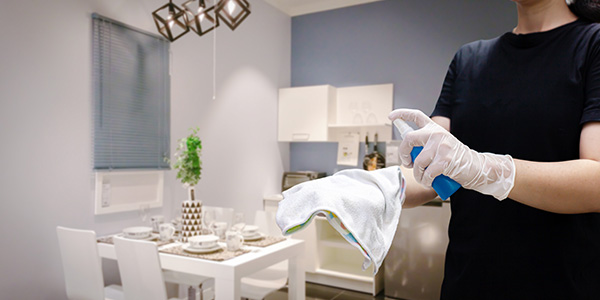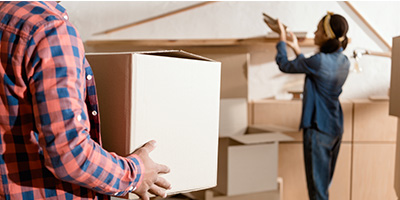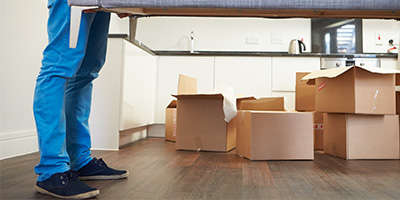The Complete Checklist Before Moving Into a New Home

Everything You Need to Do Before Moving Into a New House
Buying a new home is exciting, but keeping track of all the things you need to do before moving is a chore. While it’s easy to put your new place on the back burner when packing, completing a few projects in your house while it’s still empty can save you a lot of headaches in the future.
Use our new house checklist to discover all the projects you should complete before spending your first night in your new home.
Your Checklist for Moving Into a New Home
Wondering what things you should do before you move into a new home? Do some serious deep cleaning and make a few safety updates to protect your home before the official move-in.

1. Clean Your House From Top to Bottom
No matter how clean your new place looks, the previous owners definitely left behind some dirt. Cleaning your house before moving in should be a priority. There could be animal hair, dust or other allergens hiding almost anywhere. And there’s no guarantee the previous owners wiped down the appliances as well as you’d like. Deep clean your house from top to bottom, and don’t forget these spots:
Floors
Shampoo carpets, bleach tile and mop hardwood floors to remove allergens and leftover smells.
Walls and Baseboards
Dust first and then use a mild cleaner to wipe them down.
Cabinets
Wipe down the inside and lay new shelf paper to freshen the space.
Stove
Scrub both the stovetop and the oven to prevent any smoky surprises.
Washing Machine
Run a few cycles with vinegar and baking soda to get rid of any smells or animal hair the previous owners left behind.
Refrigerator
Use vinegar to wipe down shelves and drawers.
Ceiling Fans
Remove any leftover dust with a damp rag.
Toilet Seats
Disinfect these (if you’re not replacing them).
Light Fixtures
Remove and scrub any glass globes to get rid of grime.

2. Make Small, Functional Fixes
The “little” tasks add up in the long run. You should do the following things before moving into your new house to ensure it’s safe and secure.
Change the Locks
There’s no guarantee the previous owners turned over all the keys. Make sure to update any external locks before moving any valuable items into the house. Take the time to update any passwords or codes on your security system or garage doors while you’re at it.
Check Smoke Detectors
Smoke detectors could be faulty or have old batteries. Replace all batteries and test them thoroughly before reinstalling. If your new home has carbon monoxide detectors, test them and check for a creation date. Consider replacing any smoke or carbon monoxide detectors that are more than five years old.
Replace Air Filters
There’s no telling how old the air filters in your HVAC system are. Replacing them is especially important if someone in your house is sensitive to dust or animal hair that could have been left behind. Replace the air filters and mark the date on your calendar so you know when to replace them in the future.
Locate Circuit Breakers and Shut-Off Values
You’ll want to familiarize yourself with these items in case of a plumbing leak or tripped breaker. Be ready for an emergency by doing it before moving in. Take the time to figure out which breaker goes to each room of your home and label them for future use. (Also, it’s a good idea to store a flashlight nearby for your next power outage.
Need to get rid of stuff before moving?
These 51 things should top your list!

3. Handle the Logistics
Before moving into your new house, make sure the lights will turn on and your mail will come to the right place. Check the following things off your moving-into-first-house checklist:
Change Your Address
You can’t pay your bills if the mailman doesn’t know where to find you! Change your address on the USPS website at least two weeks before you move. Make sure to tell your extended family and friends about your move too — you don’t want to miss their holiday cards.
Transfer Utilities
Your new home should feel nice and comfortable before you settle in. It should also have electricity and running water. You know, the essentials. Turn off utilities in your old home the day after you move out and switch them on in your new home the day before you move in.
Meet Your Neighbors
It doesn’t hurt to make a few friends before moving into the neighborhood. Introduce yourself to your neighbors during the moving process. Now you’ll see some familiar faces when you collect your daily mail.
Switch Banks
Check to see if your bank has a branch in the city you’re moving to. If it doesn’t, you’ll have to switch banks. Go to your city’s Facebook page to see if any locals have bank recommendations, or stick with a larger company if that makes you feel more comfortable.

4. Make Key Home Improvements Before Moving In
If you’re planning to update your new home, complete the project while your house is still empty. Many tasks are easier (and sometimes more affordable) when the home is free of furniture, pets and family members.
Put these projects at the top of your list:
Update the Flooring
Don’t love the left-behind carpet? Do the hardwood floors need a refresh? Any flooring project is easier in an empty house. Some flooring companies may give you a discount if they don’t need to move furniture while they work.
Plus, most flooring projects are labor-intensive and time-consuming. Pulling out carpet, sanding floors and laying laminate can involve a lot of dirt and debris and take more time than you realize.

“When it comes to hardwood floors, refinishing or sanding will require the removal of all furniture, will create a lot of dust and can require extended dry times before normal traffic can resume.”
Brett Miller, VP of Technical Education | National Wood Flooring Association
Renovate the Kitchen
If you’re planning to update the kitchen in your new home, it’s best to tackle this project before moving in. Not only can kitchen renovations make a mess, but they can disrupt your whole home and prevent you from making meals.

"Probably the most disruptive renovation is the kitchen. Aside from food preparation, the kitchen is typically the gathering place for day-to-day conversation and the last place the family is before going their separate ways for the day."
Frank Lesh, Ambassador, American Society of Home Inspectors
Check for Leaks
Leaky pipes and ceilings can lead to costly home repairs down the road. This includes mold, water damage and unwanted changes in water pressure. Check for leaks in your home and make sure to fix them before moving your furniture inside.
Schedule Roof Repairs
While roofing projects can be done while your house is occupied, moving into a home where water is dripping from the ceiling isn’t fun. If you find a leak in your roof, call a roofing company to fix it. Completing this job before moving in will protect your belongings from water damage.
Paint Interior Rooms While Empty
Why waste time and money covering and moving furniture if you can complete the job while the rooms are still empty? While choosing colors before living in the house may be a challenge, the effort will pay off in the long run.
Remove Popcorn Ceilings and Walls
If your new home was built more than 15 years ago, it may have popcorn ceilings in the bedrooms or living spaces. Removing this feature is simple, but incredibly messy. If you’re determined to remove the dated ceiling, it’s best to complete this home improvement before moving in.

How Long Will It Take to Complete My Moving-Into-a-New-House Checklist
Your move-in prep time and how long your move will take depend on a few things. If your new house is just a few blocks over, you’ll have more time to prepare. But if you’re moving across the country, you might have to rush things along. The same goes for move-in ready homes and fixer-uppers.
If You’re Making a Long-Distance Move
For moves across the country, give yourself between 10 days and two weeks to move. Consider hiring a cleaning service if you won’t have enough time to clean before moving in. We recommend arriving a few days before your furniture so you can prioritize other tasks before setting up your furniture. So, if your belongings will arrive in two weeks, try to get to your new house in 10 to 12 days.
If You’re Making a Short-Distance Move
Just moving a few houses down? The actual move won’t take more than a few hours. This is good news for you, as you can easily make your home move-in ready. You’ll have plenty of time to complete your new homeowner checklist before you start hauling furniture to your new place.
If You’re Moving Into a Move-In Ready House
Move-in ready houses are ideal when you’re preparing for a move. Everything is up and running, meaning you’ll only have to give your home a deep cleaning before your furniture arrives. Easy peasy!
If You’re Moving Into a Fixer-Upper
If you bought a fixer-upper, you have your work cut out for you. Give yourself at least a month to complete key tasks before your furniture gets there. Better Homes & Gardens recommends refreshing rooms with paint and updating your flooring prior to your move-in date. You can focus on other remodeling projects and exterior updates after you’ve moved in.


